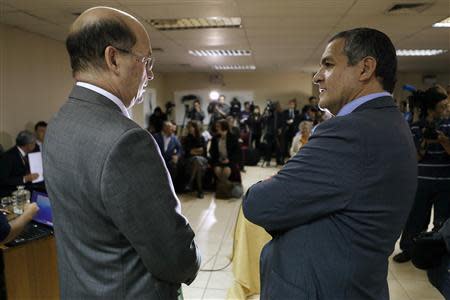No evidence Chilean poet Neruda poisoned during dictatorship -tests
By Felipe Iturrieta and Alexandra Ulmer SANTIAGO (Reuters) - An exhumation and testing of Chilean Nobel laureate Pablo Neruda's body found no evidence he was poisoned, a forensic team said on Friday, despite accusations the poet was murdered 40 years ago by a military dictatorship. Neruda, famed for his passionate love poems and staunch communist views, is presumed to have died from prostate cancer just days after the September 11, 1973, coup that ushered in the brutal dictatorship of Augusto Pinochet. Some 3,000 people are thought to have been killed during the 17-year-long military rule. The poet's former chauffeur says Pinochet's agents took advantage of Neruda's illness to inject poison into his stomach while he was bedridden at the Santa Maria clinic in Santiago. "We found no forensic evidence that gives reason to think that ... Pablo Neruda died of unnatural causes," said Patricio Bustos, head of the Justice Ministry's forensic unit, SML, during a press conference to present the results. Neruda's body was exhumed from his windswept coastal home of Isla Negra, where he was buried beside his third wife, in April, and his remains were analyzed by international and local experts. The team said it had done everything possible to determine whether he had been poisoned. Neruda's nephew Rodolfo Reyes urged further investigation, citing this week's report by a Swiss laboratory on the remains of Palestinian leader Yasser Arafat. Arafat's remains showed test results consistent with polonium poisoning, according to the Swiss experts. "We have to keep investigating," Reyes said. "This is just starting." DIGGING UP THE PAST Chilean courts are also investigating the death of ex-President Eduardo Frei Montalva, after accusations he was poisoned by Pinochet's agents in the same clinic where Neruda was hospitalized. The politician is presumed to have died in 1982 of an infection after a hernia operation. Although four decades have elapsed since Chile's bloody coup, the Andean country remains deeply polarized about socialist president Salvador Allende's overthrow and the legacy of the dictatorship. Feelings are especially rife now, just days ahead of a presidential election that pits center-left Michelle Bachelet, a victim of torture during the dictatorship, against right-wing Evelyn Matthei, whose father was a general in the junta. Elsewhere in Latin America, Venezuela exhumed the remains of 19th century independence hero Simon Bolivar in 2010 to see if he was poisoned by enemies. A study later showed Bolivar was not murdered by Colombian foes as suggested by Venezuela's late president, Hugo Chavez, but may have died of accidental poisoning. Ricardo Eliecer Neftali Reyes Basoalto, better known by his pen name Pablo Neruda, was a larger-than-life fixture in Chile's literary and political scene. Best known for his collection "Twenty Love Poems and a Song of Despair," published in 1924, Neruda was also an important political activist during a turbulent time in Chile. He organized a ship to bring about 2,000 refugees fleeing the Spanish civil war to Chile in 1939 and was ambassador to France during Allende's presidency. Chile's intelligentsia frequently congregated at his Santiago home, "La Chascona" - so named for his then-mistress Urrutia's messy red hair - and La Sebastiana, his ship-themed home in the port town of Valparaiso. (Writing by Alexandra Ulmer; Editing by Philip Barbara and Douglas Royalty)



